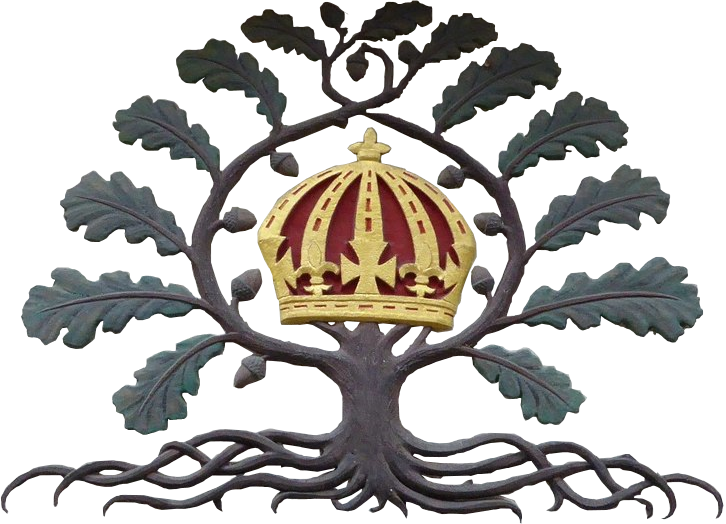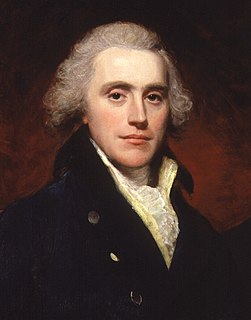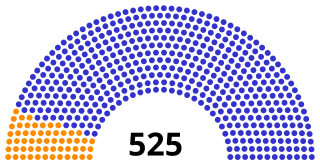
A Tory is a person who holds a political philosophy known as Toryism, based on a British version of traditionalism and conservatism, which upholds the supremacy of social order as it has evolved in the English culture throughout history. The Tory ethos has been summed up with the phrase "God, Queen, and Country". Tories are generally monarchists, were historically of a high church Anglican religious heritage, and opposed to the liberalism of the Whig faction. Typically, Tories defend the ideas of hierarchy, natural order, and aristocracy.
The Whigs were a political faction and then a political party in the parliaments of England, Scotland, Great Britain, Ireland and the United Kingdom. Between the 1680s and the 1850s, the Whigs contested power with their rivals, the Tories. The Whigs merged into the new Liberal Party in the 1850s, and other Whigs left the Liberal Party in 1886 to form the Liberal Unionist Party, which merged into the Liberals' rival, the modern day Conservative Party, in 1912.

Henry Grattan was an Irish politician and lawyer who campaigned for legislative freedom for the Irish Parliament in the late 18th century from Britain. He was a Member of the Irish Parliament (MP) from 1775 to 1801 and a Member of Parliament (MP) in Westminster from 1805 to 1820. He has been described as a superb orator and a romantic. With generous enthusiasm he demanded that Ireland should be granted its rightful status, that of an independent nation, though he always insisted that Ireland would remain linked to Great Britain by a common crown and by sharing a common political tradition.

The United Kingdom of Great Britain and Ireland was a sovereign state that existed between 1801 and 1922. It was established by the Acts of Union 1800, which merged the Kingdom of Great Britain and the Kingdom of Ireland into a unified state. The establishment of the Irish Free State in 1922 led to the remainder later being renamed the United Kingdom of Great Britain and Northern Ireland in 1927.
The Independent Irish Party (IIP) (1852–1858) was the designation chosen by the 48 Members of the United Kingdom Parliament returned from Ireland with the endorsement of the Tenant Right League in the general election of 1852. The League had secured their promise to offer an independent opposition to the dominant landlord interest, and to advance an agrarian reform programme popularly summarised as the "three F's": fair rent, fixed tenure and free sale.

The Tories were a loosely organised political faction and later a political party, in the Parliaments of England, Scotland, Great Britain, Ireland and the United Kingdom. They first emerged during the 1679 Exclusion Crisis, when they opposed Whig efforts to exclude James, Duke of York from the succession on the grounds of his Catholicism. Despite their fervent opposition to state-sponsored Catholicism, Tories opposed exclusion in the belief inheritance based on birth was the foundation of a stable society.

The 1832 United Kingdom general election, the first after the Reform Act, saw the Whigs win a large majority, with the Tories winning less than 30% of the vote.

The 1830 United Kingdom general election was triggered by the death of King George IV and produced the first parliament of the reign of his successor, William IV. Fought in the aftermath of the Swing Riots, it saw electoral reform become a major election issue. Polling took place in July and August and the Tories won a plurality over the Whigs, but division among Tory MPs allowed Earl Grey to form an effective government and take the question of electoral reform to the country the following year.

The 1826 United Kingdom general election saw the Tories under the Earl of Liverpool win a substantial and increased majority over the Whigs. In Ireland, liberal Protestant candidates favouring Catholic emancipation, backed by the Catholic Association, achieved significant gains.

The 1818 United Kingdom general election saw the Whigs gain a few seats, but the Tories under the Earl of Liverpool retained a majority of around 90 seats. The Whigs were divided over their response to growing social unrest and the introduction of the Corn Laws.

The 1807 United Kingdom general election was the third general election to be held after the Union of Great Britain and Ireland.

In the first Parliament to be held after the Union of Great Britain and Ireland on 1 January 1801, the first House of Commons of the United Kingdom was composed of all 558 members of the former Parliament of Great Britain and 100 of the members of the House of Commons of Ireland.
The Ultra-Tories were an Anglican faction of British and Irish politics that appeared in the 1820s in opposition to Catholic emancipation. The faction was later called the "extreme right-wing" of British and Irish politics.

William Bromley of Baginton, Warwickshire, was an English Tory politician who sat in the English and British House of Commons between 1690 and 1732. He was Speaker of the House of Commons of Great Britain from 1710 to 1713 and Secretary of State for the Northern Department from 1713 to 1714.
Samuel MacCurdy Greer (1810–1880), was an Irish politician who, in Ulster championed Presbyterian representation and tenant rights. He was a founder member of the Ulster Tenant Right Association and of the all-Ireland Tenant Right League. In the general election of 1857 he was returned to Westminster on a tenant-right platform for County Londonderry.

Elections in the Kingdom of Great Britain were principally general elections and by-elections to the House of Commons of Great Britain. General elections did not have fixed dates, as parliament was summoned and dissolved within the royal prerogative, although on the advice of the ministers of the Crown. The first such general election was that of 1708, and the last that of 1796.

The 1685 English general election elected the only parliament of James II of England, known as the Loyal Parliament. This was the first time the words Whig and Tory were used as names for political groupings in the Parliament of England. Party strengths are an approximation, with many MPs' allegiances being unknown.
'Church in Danger' was a political slogan used by the Tory party, and particularly by High Tories in elections during Queen Anne's reign.
The Dublin election riot occurred during the hotly contested Irish General Election of 1713.
The Londonderry City by-election of 1860 was held on 2 April following the 13 March 1860 death of the incumbent, the Liberal Party's Sir Robert Ferguson. Ferguson had held the seat since 1830 and had received significant support from the Catholic segment of the constituency. The Liberal Party's candidate Samuel MacCurdy Greer had counted on this support transferring to him, however the Irish Conservative Party's candidate William McCormick, who employed a significant number of Catholic workers, managed to split the Catholic vote. The Liberal Party's Presbyterian support had also been adversely affected by their defeat to the Tories in Londonderry County in 1857, which led many to withdraw from politics.












